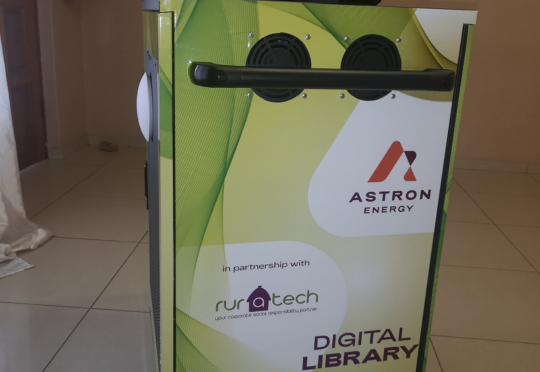In a country like South Africa, where the cultivation of science, technology, engineering, and mathematics (STEM) abilities is at the top of the education agenda, educating youths for a future of work that is centred on 4IR boils down to offering more possibilities for digital literacy education at the school level.
RuraTech, a private company with a social mission that is leading many initiatives to improve digital literacy, is helping students in underserved rural and urban regions join this movement by providing access to a digital library.
This programme supplies schools with a “tablet trolley” comprising 40 tablets (Windows or Android), a laptop for the instructor, and a no-cost offline learning platform. Vuma’s Fibre to School Programme and the UPS device included in the package will also ensure the school has constant access to the internet and power for classroom use.
RuraTech’s solar-powered computer lab is meant to fulfil the demands of rural schools that do not have brick-and-mortar classrooms or access to electricity, and it is constructed in a conventional 40-foot repurposed shipping container.
Read also: SAIL unveils STEM Inventions in Lagos State
Enabling teachers and students to explore digital learning
Jeffrey Katuruza, Director and creator of RuraTech, argues that despite the company’s youth, it has already had a significant effect via its different efforts. Over 6,000 people have benefited from our efforts to provide them with access to digital literacy materials, and the figure continues to climb.
By collaborating with Vuma, RuraTech is able to reach more schools throughout the nation, allowing more students to benefit from the company’s online resources and the offline digital literacy tools it has created.
The principal of Fernwood Park Primary School in Bethelsdorp, Gqeberha, Chanteline Le Roux, has said that the recent implementation of a digital library at the school through RuraTech allows both teachers and students to delve into hitherto uncharted areas of education.
“The learners are very excited to learn using the new technology and various resources that are now available to them and the school to utilise, which will enrich our curriculum activities,” adds Le Roux. A better understanding of how to use a computer is something that will serve students well throughout their academic careers and beyond.
Encouragement of STEM education will benefit students
“Digital literacy is the key to unlocking the potential of South African youth, now and in the future,” says Taylor Kwong, Marketing & CSI Manager at Vuma. Through facilitating access to ICT skills training and resources for students from diverse backgrounds, our collaboration has the potential to contribute to the reduction of the digital gap and the promotion of inclusivity. Doing so will enable more people to take part in the digital economy, preventing anybody from falling farther behind.
“STEM education is also crucial for the growth and development of a country like ours, so its significance in the classroom cannot be overstated. Encouragement of STEM education will benefit students and advance a wide range of industries across the country.”
Katuruza adds, “We’re grateful for the support received from Vuma and their hands-on involvement in this initiative and are looking forward to partnering with more organisations who can support the expansion of these projects more widely across communities in South Africa who can benefit from them.”
